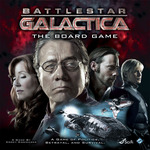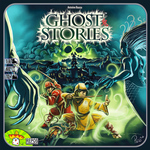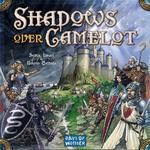

|
Time again for our quarrelsome duo, Larry Levy and Tom Rosen, to exchange verbal blows over another gaming topic. This time, theyíre arguing over one of the hot trends in the hobby -- cooperative games. Gentlemen, go to your respective corners and come out swinging!
Larry: Can the Co-ops!
Well, Tom, it looks like our first article in the series was well received and as expected (by me, at least), you were squashed by the court of public opinion. I fully expect this next debate to go the same way, so stock up on the crying towels.
Weíll be talking about cooperative games this time around and Iím agin Ďem. But unlike game expansions (the topic of our first tete-a-tete), which Iíve mostly avoided, Iíve played plenty of co-ops. I was right there when Knizia revitalized the field with Lord of the Rings a decade ago. Iíve helped King Arthur root out the traitor in Shadows Over Camelot and fought both deadly diseases in Pandemic and mindless monsters in Castle Panic. Over the years, Iíve played more than my share of cooperatives and after all that time have come to the conclusion that, with very few exceptions, theyíre just not for me.
The first reason for this is the most basic: I like competition. Not necessarily snarling, at your opponentsí throat, win at all costs competition. But yes, I like a battle of wits against a crafty opponent who is doing their best to beat you. That, by definition, is the element thatís missing in every co-op and it almost always leads to a less than fully satisfying experience. I rarely play games with children (and have none of my own), so that very popular aspect of cooperative play doesnít enter into the equation. I just find that given the choice between playing against a game system or against living, breathing opponents, Iíll choose the latter every time.
 My second reason is that the vast majority of co-ops are really extended versions of single-player solitaire. Sure, youíre not supposed to tell anyone else what cards you hold in your hand, but when it comes right down to it, itís a group attempt at solving a single problem, an effort that could be carried out just as readily with one player. As such, the whole exercise feels a little forced and designers have to include artificial rules to give the players some semblance of individuality. Even most of the ďmany vs. oneĒ cooperative games, like Scotland Yard or LotR with the Sauron expansion, are like this--these are essentially two-player games. They would be fine with two, but are invariably played with more.
My second reason is that the vast majority of co-ops are really extended versions of single-player solitaire. Sure, youíre not supposed to tell anyone else what cards you hold in your hand, but when it comes right down to it, itís a group attempt at solving a single problem, an effort that could be carried out just as readily with one player. As such, the whole exercise feels a little forced and designers have to include artificial rules to give the players some semblance of individuality. Even most of the ďmany vs. oneĒ cooperative games, like Scotland Yard or LotR with the Sauron expansion, are like this--these are essentially two-player games. They would be fine with two, but are invariably played with more.
Almost all of the exceptions to this rule are the ďtraitorĒ games, like Shadows Over Camelot and Battlestar Galactica. In theory, these designs should provide a nice sense of tension and paranoia, but in practice, they rarely deliver. More often, this is replaced by a somewhat sophomoric ďJust what Iíd expect a Cylon to doĒ mantra which becomes tiresome five minutes into the game. I donít care for bluffing and psychological games, so the mind games in these titles donít appeal to me either.
 A minor point is that many co-ops are strongly themed, but not with themes I particularly like. Iím not a big fan of Lord of the Rings, never watched Battlestar Galactica, and have only a passing knowledge of the Arthurian legends. Then there are games like Ghost Stories, with themes that are totally incomprehensible to me. Itís not so much that I find these themes unappealing, but simply that they donít add much to the experience. Iím not sure an enjoyable theme would make that much of a difference to me, but it might help a little bit.
A minor point is that many co-ops are strongly themed, but not with themes I particularly like. Iím not a big fan of Lord of the Rings, never watched Battlestar Galactica, and have only a passing knowledge of the Arthurian legends. Then there are games like Ghost Stories, with themes that are totally incomprehensible to me. Itís not so much that I find these themes unappealing, but simply that they donít add much to the experience. Iím not sure an enjoyable theme would make that much of a difference to me, but it might help a little bit.
Finally, thereís the most cited bugaboo of co-ops, the Dominant Player Syndrome. We all want to win, so itís so tempting for the player with the most experience to try to direct the other players what to do. Sometimes, itís just the bossiest player, whether or not they have the best plan. This is a hard trap to avoid and Iím sure weíve all seen it. This makes the cooperative experience even less attractive, as quieter players donít even feel like theyíre contributing.
All of these reasons contribute to my increasing disillusionment with cooperatives, but the biggest factor is the first one. If you find what you really like is the competitive nature of games, you have a strong incentive to routinely avoid the co-ops. More and more, thatís what Iíve been doing and, with few exceptions, I donít think Iím missing much at all.
All right, Tommy, those are my reasons and theyíre good ones. You can try to spread your co-op love, but I donít think anyone will be buying!
Tom: Learning to Play Well with Others
The genre of cooperative games has something for everyone. There are the pure co-ops, like Ghost Stories or Pandemic, that pit the players against a puzzle to solve collectively. There are speed co-ops, like Wok Star or Space Alert, that specialize in frantic fun. There are all vs. one games, like Letters from Whitechapel or Descent, that provide remarkable asymmetric experiences. And there are traitor games, like Battlestar Galactica or Castle Panic, that are the epitome of tense. If you canít find something in there for you then you are quite the picky gamer.
 If I can break down your attempt at an argument, I see five points to rebut: (1) competition; (2) solitaire; (3) psychological; (4) theme; and (5) dominant player. That should be easy enough.
If I can break down your attempt at an argument, I see five points to rebut: (1) competition; (2) solitaire; (3) psychological; (4) theme; and (5) dominant player. That should be easy enough.
Competition is easy, cooperative games are filled with it. You just have to open your mind a bit. Itís not an accident that cooperative games are notorious for kicking the living daylights out of players the first few times they play them, whether itís an epic beat-down from Wu-Feng or gnomes dropping dead left and right in a doomed submarine. Players compete against the game in cooperative games and the game doesnít play nice. Just as in Survival Games (like Antiquity or In the Year of the Dragon) where players compete against the game system as much or more than against each other, cooperative games just take it one step further so players can focus on competing with the game system.
The solitaire nature of some cooperative games is an asset, not a fault. Certain cooperative games are remarkably easy to play as solitaire games and work extremely well. You can fight disease or ghosts on your own, which makes those purchases so much more versatile than most games. Itís a nice change of pace to sit down to a game on your own and challenge yourself. Luckily for those of you like Larry who arenít interested in broadening your horizons with such a novel experience, there are plenty of cooperative games that canít possibly be played solitaire. Iíd like to see you try to peg Hanabi or Space Alert as solitaire games in sheepís clothing, let alone Letters from Whitechapel or Battlestar Galactica. And just because Pandemic or Ghost Stories can be played solitaire doesnít mean they donít benefit from having extra minds at the table to formulate strategy together. For instance, the dynamic in Letters from Whitechapel changes when you add that third player and suddenly there are two investigators pooling their mental resources.
 The psychological aspect of a subset of cooperative games may not be for everyone but it provides a memorable narrative that no other type of game can hope to replicate. The paranoia inspired by games like Battlestar Galactica or Shadows over Camelot is not only engaging in the moment but also the perfect recipe for a memorable game experience that the players can recall far into the future. Unlike so many bland games these days that are forgotten as soon as theyíre back on the shelf, traitor games keep you entertained recalling them long after theyíre packed up. If you canít handle the heat of being grilled about your allegiance by your fellow players then feel free to get out of the kitchen, but the rest of us will be in here having a raucous good time.
The psychological aspect of a subset of cooperative games may not be for everyone but it provides a memorable narrative that no other type of game can hope to replicate. The paranoia inspired by games like Battlestar Galactica or Shadows over Camelot is not only engaging in the moment but also the perfect recipe for a memorable game experience that the players can recall far into the future. Unlike so many bland games these days that are forgotten as soon as theyíre back on the shelf, traitor games keep you entertained recalling them long after theyíre packed up. If you canít handle the heat of being grilled about your allegiance by your fellow players then feel free to get out of the kitchen, but the rest of us will be in here having a raucous good time.
As for theme, diversity of theme is one of the great selling points of cooperative games. If you canít find a theme you like among the myriad cooperative games then youíre just not trying. Are you telling me that among the following games not a single theme interests you? Because if thatís the case then I guess you might as well just stick with Renaissance Italy and Egyptian auctions. Arkham Horror, Battlestar Galactica, Castle Panic, Defenders of the Realm, Descent, Forbidden Island, Ghost Stories, Hanabi, Letters from Whitechapel, Lord of the Rings, Pandemic, Red November, Shadows over Camelot, Space Alert, Space Hulk: Death Angel, and Wok Star. Yes, fantasy and science fiction themes are more prevalent among cooperative games than board games generally it would seem, but there are others there for those of you in denial of your geekhood.
Last and least, the Dominant Player Syndrome is a bunch of hog wash. If you canít find friends to play with that wonít ruin the experience then you probably shouldnít even bother with board games. I trust you can find some people to play with that wonít boss each other around and make each other miserable. Moreover, lots of different types of games can be ruined by certain player attributes, but that doesnít mean you should discount them entirely. You wouldnít want to play Tikal with an analysis-paralysis player, 18XX with a math-phobe, Igloo Pop with someone hard of hearing, Poker with someone without any poker face, or Bausack with a total klutz. But that doesnít mean those games donít have merit and canít be played when you have the right people around. Not only is the Dominant Player Syndrome argument worthless because of these reasons, but itís also completely inapplicable to so many innovative cooperative games these days, like Space Alert, Wok Star, Hanabi, or Castle Panic.
The genre of cooperative games has grown so broad and diverse that itís impossible to pigeon-hole them any longer. Donít feel bad for being incapable of coming up with an argument against them that holds water. Theyíre just too multifaceted to succumb to any criticism you can come up with. Thereís something in the genre for everyone whoís willing to learn how to play well with others.
Larryís Rebuttal
Jeez, Tom, is that the best you can come up with? Maybe youíve been wallowing in your cooperative games for so long that youíve lost the killer instinct!
Doing battle with a game system is not the same as competing with living, breathing opponents. If it were, Iíd be perfectly happy solving crossword puzzles for the rest of my life and could save a lot of money by not buying games. I love games where you have to struggle against the mechanics, but what makes those battles so enjoyable is the challenge of doing it better than everyone else in the game. Maybe that makes me a competition junkie, but as I said, Iím not a win-at-all-costs gamer, just one who really enjoys the contentious aspect of gaming and who feels that competition is what makes the whole process meaningful.
 Yeah, itís nice that most co-ops can work well in solitaire mode, but that aspect is far, far down the list of things I look for when considering whether to buy a game. I very rarely play solitaire games. I much prefer FTF games and usually have better ways of spending my time than such solo contests. Itís great that other people enjoy them, but the point of this article isnít that cooperative games are bad, just that they arenít for me.
Yeah, itís nice that most co-ops can work well in solitaire mode, but that aspect is far, far down the list of things I look for when considering whether to buy a game. I very rarely play solitaire games. I much prefer FTF games and usually have better ways of spending my time than such solo contests. Itís great that other people enjoy them, but the point of this article isnít that cooperative games are bad, just that they arenít for me.
However, I find it interesting that the two games you cite that really canít be categorized as solitaire games are Hanabi and Space Alert. Thatís because those are probably the only cooperative games that Iíll actually suggest playing. Hanabiís unique and very innovative mechanics really set it apart from any other co-op Iíve seen. Itís an extremely enjoyable puzzle where the presence of other players is essential to the game. Space Alert works due to its theme and its inherent humor and fun, but mostly because it uses time pressure to overcome most of the objections I have to cooperatives. Both games find different ways to avoid being solitaire pastimes and that seems to be an essential element for me to enjoy a cooperative game.
 Traitor co-ops should induce some pleasurable paranoia, but in practice I havenít found it to be the case. Shadows Over Camelot seems to lead more to wariness of your opponents than anything resembling paranoia. Itís a matter of degree, but thereís a pretty significant difference to my way of thinking and I think it may be due to the fairly abstract nature of the game. I found it enjoyable for a few plays way back when, but then it fell into a deep black hole for the group from which it is yet to emerge. And Battlestar Galactica didnít do it for me at all. It wasnít a matter of not being able to handle the tension but more about being bored by the whole process. When the chances for a traitor are that high, I usually just assume everyone is out to get me anyway and there isnít too much thatís tense about that.
Traitor co-ops should induce some pleasurable paranoia, but in practice I havenít found it to be the case. Shadows Over Camelot seems to lead more to wariness of your opponents than anything resembling paranoia. Itís a matter of degree, but thereís a pretty significant difference to my way of thinking and I think it may be due to the fairly abstract nature of the game. I found it enjoyable for a few plays way back when, but then it fell into a deep black hole for the group from which it is yet to emerge. And Battlestar Galactica didnít do it for me at all. It wasnít a matter of not being able to handle the tension but more about being bored by the whole process. When the chances for a traitor are that high, I usually just assume everyone is out to get me anyway and there isnít too much thatís tense about that.
There are some mildly interesting themes in co-ops, but most of them donít really grab me. I donít think I can be castigated too strongly for not swooning over bland fantasy, weird Chinese poltergeists, and pulp science fiction. With very few exceptions (Space Alert is one of them), the themes arenít strong enough to make me feel like Iím doing much more than pushing cubes.
If you havenít had to deal with dominant players in your cooperatives, then youíre a lucky man. The fact is, itís a hard thing to avoid. We all want to win, so it can be natural to lean on the person who seems to have the best ideas. Iím not talking about bossiness, just players trying to maximize their chances of success. It comes up often enough to give me another reason to avoid games like this.
And playing well with others? Thatís your big summary??? So now instead of digging into a nice vicious game we should just join hands and launch into a few stanzas of Kumbayah? I play just fine with others, mostly by trying to beat their brains in while theyíre doing the same to me. We laugh before, during, and after this period of competition, with no bruised egos or shattered friendships. I can have a great time locking horns with my buds at the game table and the experience is enhanced by the competition. Maybe that means Iíll be living off of red meat for the rest of my gaming days, but those are the designs I like the most. Vive le competition!
Tomís Final Word
The point of this article is that cooperative games are an excellent genre, not that theyíre bad or that theyíre ďnot for you.Ē They are a thriving, promising new field in game design. What's most exciting is that they're just emerging from their infancy. Designers are beginning to push the boundaries, trying out new and innovative things. Unlike genres such as auction games or area majority games where there are already so many designs out there and it has become very difficult for a designer to break new ground, cooperative games are a fertile area for innovation. It's always fun to try out a new cooperative game because you don't know what you're in for and you may just see something you've never seen before.
 It sounds like you've already come around with the innovative likes of Hanabi and Space Alert, so we have ourselves another convert to the cooperative club. Your membership badge to the cooperative fan club should be in the mail shortly.
It sounds like you've already come around with the innovative likes of Hanabi and Space Alert, so we have ourselves another convert to the cooperative club. Your membership badge to the cooperative fan club should be in the mail shortly.
Vive le competition indeed. Competition with your teammates against a covert villain in Letters from Whitechapel or an evil overlord in Descent. Competition against the devilish machinations from the minds of Leacock or Bauza in Pandemic or Ghost Stories. Competition to root out the sneaky traitors in Battlestar or Camelot. Competition against the ticking of the clock in the great beyond of Space Alert or in the kitchen of Wok Star. Thatís a whole lot of edge-of-your-seat, nail-biting competition! Cooperative games are not for the feint of heart as they pit you against some of the biggest challenges youíll find in board gaming, but for those with a bit of team spirit and a bunch of bravado, cooperative games are a bastion of innovative fun.
(See The Opinionated Gamers for this column plus additional comments on it)